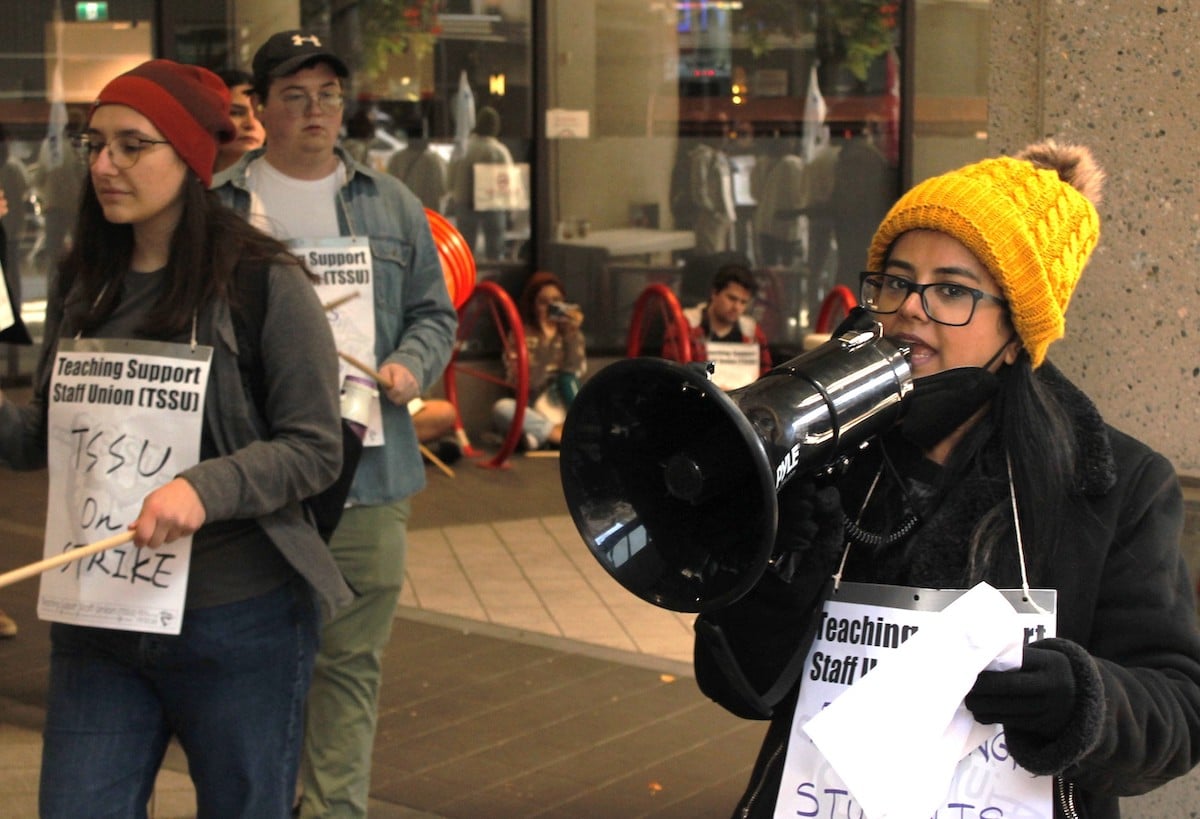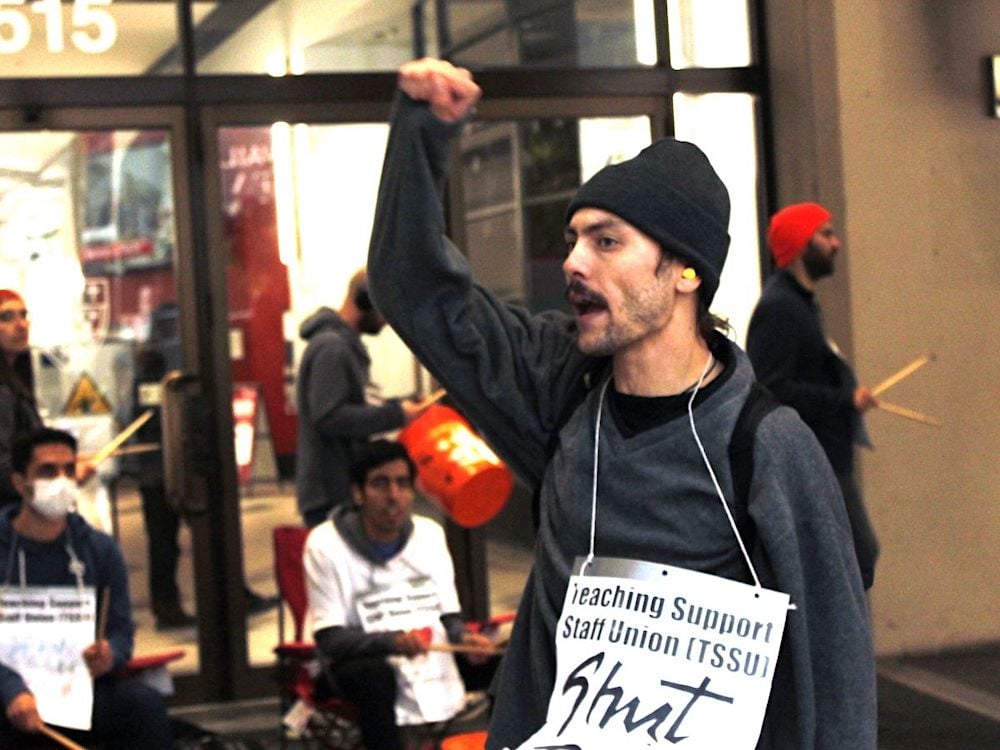On a September morning in 2023, roughly 40 members of the Teaching Support Staff Union, or TSSU, stood at a picket line at Simon Fraser University’s campus in Surrey, B.C.
The picketers chanted, waved signs and banged drumsticks against bright orange Home Depot buckets, which doubled as chairs.
They didn’t know they were being secretly videotaped and photographed by a team of private investigators.
SFU had hired Lions Gate Risk Management Group, a private security company whose previous clients include resource companies and Huawei CFO Meng Wanzhou, to surveil the TSSU’s picket lines during a bitter three-week strike.
PressProgress first reported on that contract in October, which the university cancelled shortly thereafter.
The Investigative Journalism Foundation and The Tyee have now obtained hundreds of pages of documents about SFU’s contract with Lions Gate through freedom of information legislation.
They reveal SFU hired investigators, in part, to build evidence to file for an injunction against the TSSU’s picket lines.
The school instructed Lions Gate to only videotape suspected illegal or problematic activity. But the company’s reports include dozens of video stills that suggest they filmed picketers constantly, including when no laws were being broken.
“There’s pages and pages of just picketers picketing,” said TSSU member representative Derek Sahota.
The picket lines were public demonstrations. But Sahota, whose union also obtained records about the contract through FOI, said the extent and secrecy of SFU’s surveillance go well beyond what is typical in most labour disputes. Sahota said the school “crossed a moral line” by using taxpayer money to monitor a lawful strike.
“I believe they were looking for any way to break the union,” Sahota said. “This was just one of the tools in their tool kits they felt they could use.”
SFU did not make a representative available for an interview for this story.

In a prepared statement, spokesman Will Henderson said the school hired Lions Gate after receiving complaints about union members violating the labour code and “being disrespectful to students, faculty and staff.”
Henderson said Lions Gate was hired “to gather evidence to support any legal action that may be required.”
“Discretion was advised, as the university did not intend to intimidate, interfere or escalate any actions. They were solely hired to observe and document any unlawful behaviour,” Henderson said.
But Henderson also said the school “could have done more due diligence in the selection of a provider.”
The documents obtained by the IJF and The Tyee show that even after media reports, the university cancelled the contract only after complaints from Indigenous faculty, who pointed out Lions Gate had also worked for the Trans Mountain pipeline project.
“Hiring this company was not the right choice for SFU,” SFU vice-president of finance and administration Martin Pochurko later wrote in an email to Indigenous faculty.
A bitter dispute
The TSSU launched job action in June 2023. But the full strike did not start until September.
At that point, the union’s members had not had a collective agreement since 2022. They were demanding better job security and higher wages — higher than what SFU said it was allowed to pay under a B.C. government mandate.
The TSSU announced a full work stoppage on Sept. 28, accompanied by “rotating” picket lines that would move among the school’s three Lower Mainland campuses.
Six days before the strike began, SFU had already retained Lions Gate, part of Scarlet Security & Risk Group.
Internal emails suggest executives were concerned about reports from community members about tense confrontations at previous picket lines. The contract with Lions Gate was signed with the knowledge of top SFU executives, including James Beresford, the chief of staff of university president Joy Johnson.
But some staff seem to have questioned whether surveillance was necessary. A Sept. 26 email indicates Beresford asked officials to “re-examine appropriate approval” of the contract.
One email said evidence gathered by Lions Gate could be used for “injunction seeking.”
“A discreet and professional third party resource was determined to be the appropriate option for this collection,” one email reads. Most firm members, emails said, were former law enforcement, and were skilled in filing briefs for legal proceedings.
Still, SFU officials wanted guardrails on how surveillance was done. On Sept. 27, SFU’s vice-president of people, equity and inclusion, Yabome Gilpin-Jackson, wrote instructions on when picketers should be filmed.
She wrote that videotaping should happen only “if there is any illegal activity” or “if there are any escalations.”
The next day, four Lions Gate investigators arrived at the union’s picket line.
Their report from that day — and for the next two weeks — included dozens of video stills of picketers and time-stamped notes.
Some of those notes do outline instances of activity that could violate the province’s labour laws. At one point, TSSU members interrupted a class in session. Investigators wrote they sometimes filmed pickets blocking entry to buildings.
But many photos and the accompanying notes suggest picketers were also filmed when no suspected illegal activity was happening.
Some reports include photos of picketers sitting on orange Home Depot buckets. In other photos, they are shown standing outside buildings holding signs.

The IJF and The Tyee phoned Lions Gate executive vice-president Rob Marshall, who declined to comment at the time. He did not respond to a further email requesting comment.
The IJF and The Tyee asked SFU about whether Lions Gate followed the school’s instructions to film only illegal or problematic activity. Henderson, the school’s spokesman, wrote that Lions Gate “fulfilled the services that they were hired for.”
Henderson did not say how much money SFU spent on its agreement with Lions Gate. A contract obtained by The Tyee and the IJF shows SFU had authorized spending up to $16,000 but does not say how much was actually paid.
Aislin Jackson, policy staff counsel for the BC Civil Liberties Association, said photographing and videotaping protesters was likely legal given they were in a public space.
But Jackson said SFU’s decision to hire a private company raises privacy considerations and an “accountability gap” on how much personal information is collected and why.
“We see that they are surveilling quite closely what people are saying, what people are calling people. There’s a very granular level of surveillance. And you could argue the granularity of that surveillance goes beyond what the brief was,” Jackson said.
Jackson said the extent of SFU’s surveillance could also have a “chilling effect” on picketers who were exercising their Charter rights to assemble.
“I imagine a lot of the strikers who were surveilled like this feel really uncomfortable with it, and it might cause them to second-guess participating in strike action in the future,” Jackson said.
The fallout
TSSU members were never told they were being recorded. But over time, they began to recognize investigators.
Sahota recalls seeing a man recording him one day at the university’s Surrey campus. Five days later, he saw the same person in Burnaby.
Later, Sahota said, union members confronted the investigators, who acknowledged they had been hired by the university.
At the time, tensions between the TSSU and SFU had continued to mount. Internal briefings show the school was preparing to ask the B.C. Supreme Court for an injunction against the TSSU’s picket lines.

After the contract with Lions Gate was reported on in the media, the school doubled down. One email — the sender and recipient of which are redacted — says Lions Gate was instructed on Oct. 11 to “swap out” the company’s “resources” and to “keep distance and remain discreet.”
But pressure began to build when a group of Indigenous faculty noted the company had also worked for timber company Teal-Jones and energy company Kinder Morgan. Both companies had been embroiled in controversial standoffs and police actions wherein many protesters — some of them Indigenous — were arrested.
Professor annie ross, who spells her names without capital letters, was one of a group of professors in the department of Indigenous studies who wrote to the school’s executive in protest.
In an interview, ross said she was frustrated the school was spending money on a private security company while claiming it could not afford higher wages for TSSU members, who include teaching assistants, sessional lecturers and some instructors of English as an additional language.
“I struggle with the vocabulary for this to be occurring, where the students are made the enemy,” ross said.
Within an hour of receiving ross’s email, Gilpin-Jackson wrote to other SFU executives.
“Just got all these updates and chatted with Joy also. In light of this I think we should amend the response just posted immediately to say in light of feedback on the role of the company in Trans Mountain Pipeline we have cancelled the contract immediately,” Gilpin-Jackson wrote.
The strike ended later that month and both sides ratified a new contract.
But while SFU says it regrets hiring Lions Gate, it has not said if it would avoid hiring such companies in the future. Henderson said the school is now “reviewing the strike policy and procedures regarding actions surrounding future labour demonstrations.”
Sahota said the Lions Gate revelation “undermines what is already a broken relationship that we are trying to rebuild” with the university.
“We’re constantly told there’s no money for our members,” Sahota said. “And they were spending it to surveil our members.”
This story is a collaboration between The Tyee and the Investigative Journalism Foundation. ![]()
Read more: Rights + Justice, Education, Labour + Industry

















Tyee Commenting Guidelines
Comments that violate guidelines risk being deleted, and violations may result in a temporary or permanent user ban. Maintain the spirit of good conversation to stay in the discussion and be patient with moderators. Comments are reviewed regularly but not in real time.
Do:
Do not: